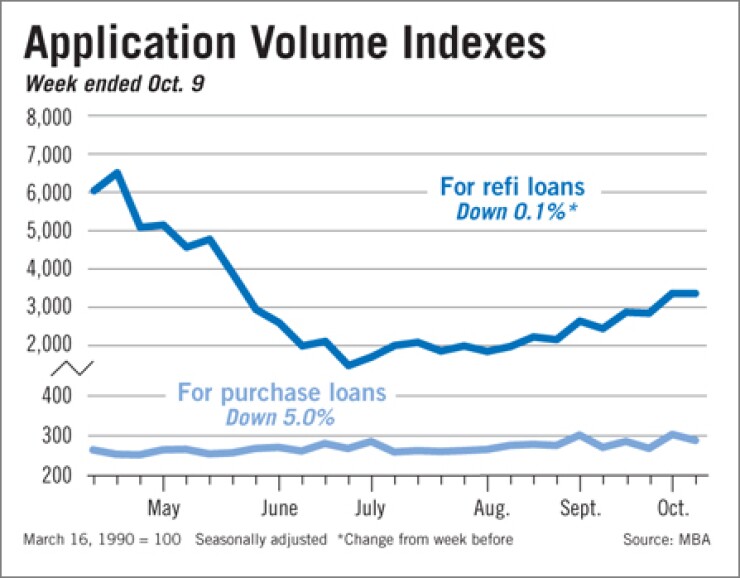
Return to Normal?
Banks are poised to pick up the slack as the Federal Reserve Board withdraws from the mortgage-backed securities market, analysts and buyers of such bonds say.
The Fed's $925 billion of
But those who closely follow the MBS market say they do not expect a serious disruption. They expect the difference in yield between these securities and benchmark rates to widen only modestly as traditional buyers — banks in particular — snap up the securities.
"Bank portfolio managers would love the opportunity to buy" agency mortgage bonds "on any spread widening," said Scott Colbert, the director of fixed-income management at Commerce Trust Co., an asset management and private banking firm. "I think there is a great deal of demand, and a portfolio that naturally will be growing next year, because as you come out of a recession, usually it takes a while for the lending growth to pick up," he said.
Analysts at Barclays PLC's investment bank predicted in a report last week that banks will add another $200 billion, or $15 billion to $20 billion a month, of agency mortgage bonds over the next year. They cited a historical pattern under which banks shift to securities as loan demand wanes at the end of recessions, the enticement of a steep yield curve and a lack of issuance of alternative triple-A securities like commercial mortgage bonds.
Even with the central bank's purchases driving down yields, banks have already been significant buyers, adding nearly $100 billion to their combined holdings in the first half, according to Barclays' analysis of Fed data.
Matthew Jozoff, head of mortgage research at JPMorgan Chase & Co., said spreads would probably widen by about 20 basis points to provide private investors with returns sufficient enough to induce them to replace the Fed.
With the Fed's buying driving trading prices to "rich levels," many private investors and money managers sold their holdings, "giving their mortgages to the Fed, because the Fed had the best bid by far," Jozoff said. "A lot of people are underweight mortgages now and are looking to buy them back at cheaper levels."
One of those people is Colbert. "I don't have a lot of product to buy anymore," he said. In addition to about $5 billion of client money allocated to fixed-income investments, his group manages the $6 billion securities portfolio at Commerce Bancshares Inc. of Kansas City, Mo., Commerce Trust's $17.5 billion-asset parent.
Arthur Frank, the director of mortgage-backed securities research at Deutsche Bank AG's securities arm, said that spreads would widen by a "worst case" 25 basis points before reaching a new equilibrium without the Fed.
That level would be needed for yields to generate satisfactory returns for large hedge funds and proprietary trading desks, Frank said, and "it's quite possible" that banks and unleveraged investors could take up the slack themselves after about 15 basis points of widening.
With the Fed now having bridged over the severe volatility and extraordinarily wide spreads sparked by the cascade of problems last year, "normalcy has returned to the fixed-income marketplace," Frank said.
History Lesson
David Stevens, the commissioner of the Federal Housing Administration, says the critics who are pushing to increase his agency's down-payment requirement have misdiagnosed the mortgage crisis.
"It isn't the [lack of a] down payment on its own that causes a default," Stevens said Monday at the Mortgage Bankers Association's annual convention in San Diego. "It's the
Rep. Scott Garrett, R-N.J.,
"Quite frankly, the intangible impact of these minor changes being proposed would stagnate or forestall a recovery," he said.
Frank Freddie
Charles E. Haldeman Jr., Freddie's
"It would be a mistake for the industry to take glimpses of hope from housing prices," Haldeman said at the MBA conference. "We ought to assume no improvement."
There is "no indication" that businesses are starting to rehire workers or that consumers are starting to spend more, he said.
"Both make me pessimistic about unemployment for a long time," Haldeman said. "It would be a mistake to assume this is anything but a major problem."





